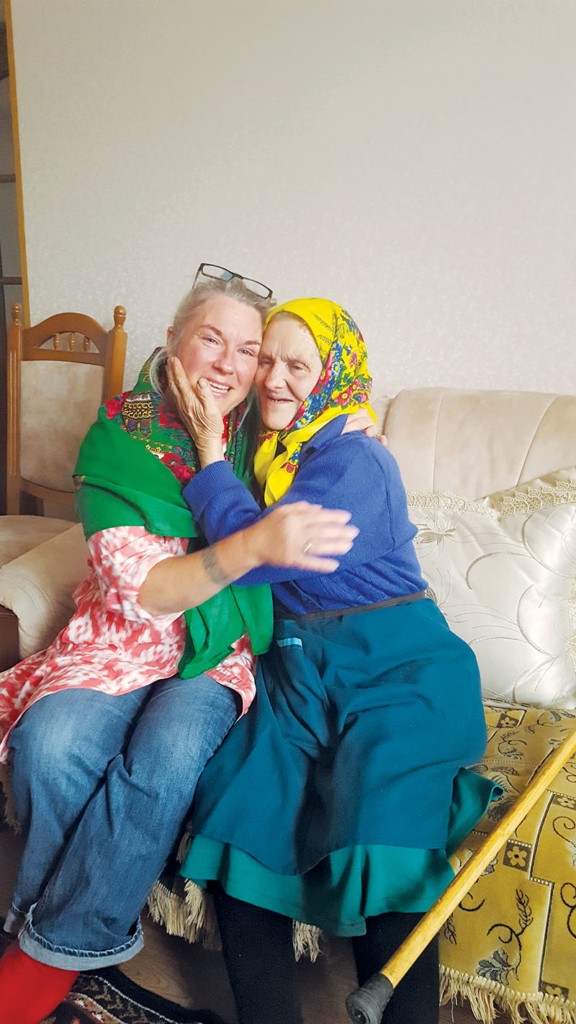Tabitha Bilaniwskyj-Zarins, 47, came to Kyiv with her husband in May from their native Australia to attend the Eurovision Song Contest.
But she had another goal — to find Ukrainian relatives with whom she had never met or communicated.
The only information Bilaniwskyj-Zarins had was three addresses in Trebukhiv, a village 35 kilometers east from Kyiv, where her relatives had been living years ago.
However, she remembered her grandmother, or “baba,” as Bilaniwskyj-Zarins called her, telling her: “Never forget you are a Ukrainian.” So she held on to her dream of tracking down her lost relatives.
Baba
Bilaniwskyj-Zarins’ grandmother, Galina Korniyko, was a Ukrainian immigrant to Australia. She survived the Holodomor, Soviet dictator Josef Stalin’s genocidal famine of the 1930s in Ukraine, while her six youngest sisters and brothers died. She decided to go to the German labor camps in 1944–1945, having no idea that life there would be horrible. Korniyko planned to earn money and come back to Ukraine. But she came back only once — in 1992, when the Soviet Union fell apart and Ukraine regained its independence.
In the labor camp, Korniyko met her first husband, Belarusian Ivan Bilaniwskyj, the future grandfather of Bilaniwskyj-Zarins. Their first child Vera was born in Germany. When World War II ended, Korniyko was afraid to go back to Ukraine — she was considered a traitor in Soviet Ukraine. She believed she would be killed by the Russian army. Instead, Korniyko moved to Australia with her husband, baby — and no English-language skills.
Soon after moving, Korniyko had another child — Volodymyr, the father of Bilaniwskyj-Zarins. Bilaniwskyj-Zarins never met her grandfather. He left the family soon after her father was born.
She has always admired her baba for her strength in raising the family on her own.
“I see her as such an amazing and incredible woman, who was by herself in Australia, but stayed so strong and had so much love for her family,” she told the Kyiv Post.
Korniyko worked as a cook in a hospital in Sydney, preparing Ukrainian food for patients. She taught Bilaniwskyj-Zarins how to cook the traditional Ukrainian dishes — borscht, varenyky and pyrohy.
Korniyko died in 1992 soon after returning from Ukraine where she had met her father after nearly 50 years of parting. She had never met her mother again, as when Korniyko visited Ukraine, she had already died.
Looking for family
Coming to Kyiv, Bilaniwskyj-Zarins didn’t know whether any of her relatives were still alive or still at the same address her grandmother had given her. She also doesn’t know any Ukrainian or Russian.
She and her husband went to the museum that serves as a memorial to Holodomor victims, where she found her grandmother’s last name next to the name of the village. It matched what her grandmother had given her.
“I understood that I was on the right track,” she says. “It was amazing.”
On May 11, Bilaniwskyj-Zarins and her husband went to Trebukhiv. She took a bus from Kyiv’s Lisova metro station. When they finally got to the village, there were no street signs. They met a man who spoke a little English and showed him one of the addresses.
“This man looked at the address, and we started walking with him in complete silence. It was a rather strange moment,” she said. “He started to make phone calls and spoke Ukrainian. And only after a while, he explained that his father lived on the same street and he knew my family and started calling to let others know that we were coming.”

Tabitha Bilaniwskyj-Zarins hugs the youngest sister of her grandmother, whom she met for the first time in her life in May. (Courtesy)
New home
The entire family still lived in the same village and surrounding area.
Bilaniwskyj-Zarins met her grandmother’s sister and brother, their children and grandchildren. She looked through family photo albums, finding there the pictures of her baba and father.
“Frankly speaking, everyone was shocked,” Bilaniwskyj-Zarins recalled.
They had a traditional Ukrainian homemade dinner and talked through the night. Bilaniwskyj-Zarins doesn’t speak Ukrainian, but some of the younger relatives knew some English, so they could understand each other.
“I have a very big family and it is only the beginning of meeting some of them. I still can’t believe it. We stayed up through the night and it was so amazing that I can’t describe it with words. The house was so warm and the atmosphere was full of love, surprising and welcoming,” Bilaniwskyj-Zarins said.
Next day they went to a cemetery where a lot of family members are buried, to a church where everyone in the family was married, as well as to the house where Bilaniwskyj-Zarins’ grandmother had grown up.
Bilaniwskyj-Zarins ended up missing many Eurovision events to spend more time with her family. She plans to return to Kyiv next year together with her Australian family.
After returning to Australia, she started studying Ukrainian history, and is keeping in touch with her Ukrainian relatives.
Bilaniwskyj-Zarins advised anyone whose family had been broken up by war to do as she had done.
“Ask your grandparents more about family history as long as there is an opportunity,” she said. “Just imagine: If I had not done this, I’d have never found my whole family, and found real happiness.”
